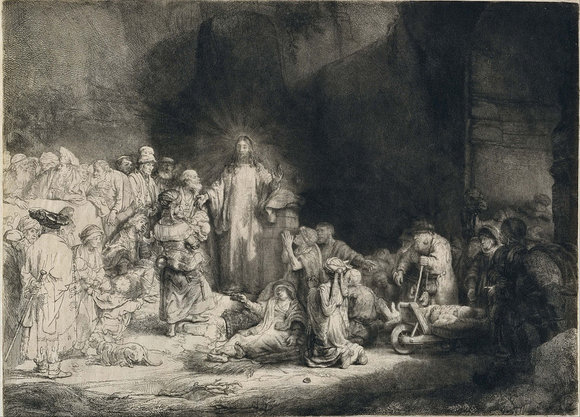
In Times of Sickness
By Br Bede Mullens, O.P. | The Coronavirus outbreak is forcing us to confront a fragility in our way of life which we commonly have the good fortune to ignore. At the same time, Christians particularly should beware false panic or exaggerated speculation. What can we learn from the experience of a disease which will somehow affect us all, whether we contract it or not?
We often experience sickness as a matter for individuals, and perhaps their close circle of family and friends. Modern medicine has not completely eradicated disease, but one of its great achievements is surely to have made many diseases much rarer and more difficult to contract. So in countries like the UK, when we think of illness we tend to think of malfunctions of the body itself – cancer, heart failure, congenital conditions – whose immediate causes are to be found internally, not in bugs, viruses, bacteria.
The Coronavirus outbreak has reminded us what it is like to share disease on a mass scale, even if the absolute numbers (in England, that is) are still quite small – though fast-growing. Perhaps that unfamiliarity is one reason why the coronavirus is provoking so much concern. Plagues are devastating even in times and places where they are far more common – and in many parts of the world, even today, diseases far nastier and more deadly than Covid-19 are quite prevalent. The outbreak of Ebola in Western Africa between December 2013 and 2016 was recorded by the WHO as having a nearly 40% mortality rate. The Black Death in four years (1347-1351), is thought on middling estimates to have killed off the same percentage of the entire European population of the time.
We are not facing the Black Death or Ebola. We are, however, being forced to confront a fragility in our way of life which we commonly have the good fortune to ignore. Our public welfare systems, the flow of goods and services, the capacities of high-level medical science are all being put under considerable strain even in the anticipation of Coronavirus’ worst effects, and governments, public authorities, workplaces and institutions can all only do their best to check the spread, help the sick and allow everyone as far as possible to carry on. Predicted seasonal outbreaks and diseases which may or may not crop up in the lives of this or that person, we have a way of just about dealing with; when a new and unpredicted disease puts a large section of the population at risk, we find ourselves at a loss.
It is always bad practice on the part of Christians to make out divine motivation for outbreaks of disease, sheer presumption when preachers declare it “punishment for sin”, or (still worse) “punishment of those sinners who’ve got it”. The Lord himself forbids this attitude: “Those eighteen upon whom the tower fell at Siloam and killed them, do you think that they were the only sinners out of all the people living in Jerusalem? No, I tell you, but if you do not repent, you will all perish like them” (Luke 13.4-5).
That said, the Christian does have something to learn from pestilence: “No, I tell you, but if you do not repent, you will all perish like them.” Some of the lessons are the very ones that Coronavirus is highlighting for us now. Life is fragile; death comes to all, and very often before it there is weakness and languor and discomfort. Memento mori – but remember also that while we pass through this life, there are tears to be shed. Another kind of presumption is shown by a false sense of security.
Then there is the lesson about healing, and about hope. Christ comes to us as a doctor: “It is not the strong who need a physician, but those who are unwell; I did not come to call the righteous, but sinners” (Mark 2.17). In the lives of many saints, times of sickness have been graced moments of conversion: St Augustine took illness as an occasion to retire from public life, to prepare himself to convert to Christianity; Julian of Norwich experienced her moving ‘shewings’ of Divine Love, and grew great in wisdom while tormented by a mysterious illness.
So sickness prompts us to take stock of our spiritual wellbeing as much as our physical. That doesn’t make it any easier, and won’t necessarily alleviate the anxiety we feel at present. But it should put it in some perspective; and it should encourage us to persevere in prayer at these moments, whether in our own sickness or in solidarity with others who are ill. God himself has anticipated our need for prayer in such times; here are some words from Scripture you might like to use to get yourself praying.
“O Lord, do not rebuke me in your anger,
or discipline me in your wrath.
For your arrows have sunk into me,
and your hand has come down on me.
There is no soundness in my flesh
because of your indignation;
there is no health in my bones
because of my sin.
For my iniquities have gone over my head;
they weigh like a burden too heavy for me.
My wounds grow foul and fester
because of my foolishness;
I am utterly bowed down and prostrate;
all day long I go around mourning.
For my loins are filled with burning,
and there is no soundness in my flesh.
I am utterly spent and crushed;
I groan because of the tumult of my heart.
O Lord, all my longing is known to you;
my sighing is not hidden from you.
Do not forsake me, O Lord;
O my God, do not be far from me;
make haste to help me,
O Lord, my salvation.” (Psalm 38.1-9, 21-22)
Image: Rembrandt, Christ with the sick around him, receiving little children (The ‘Hundred Guilder Print’) (Wikimedia Commons)


